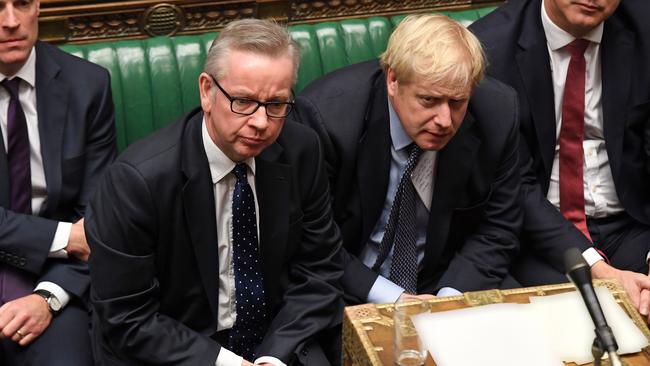
The Sunday Times reports that diplomatic sources said the delay would be “fungible”, meaning Britain could leave earlier, on November 1 or 15, December or January, if the British Prime Minister’s deal is ratified before the extension ends.
No decision will be taken until EU governments have the chance to assess the chances of the withdrawal treaty getting through parliament before Tuesday this week, the newspaper added.
If Mr Johnson runs into serious trouble or MPs force a second referendum then countries led by Germany will push for a longer extension, possibly until June next year.
A bullish Mr Johnson will attempt to table his Brexit deal with the EU for a second time in the UK parliament on Monday but could be thwarted by the Remainer Speaker of the House of Commons, John Bercow.
Mr Johnson said on Sunday he was undeterred after the farcical sitting where the Commons thwarted Brexit once again, voting to delay Brexit and request an extension until January 2020.
He wants to push the deal through so the country can leave Brussels on his “no ifs, no buts” deadline of October 31 with the Brexit deal he secured from EU leaders last Thursday in place.
He pulled the vote — at which he was close to securing a majority of 320 supporters — planned for the special Saturday sitting of the Commons as it would only have been indicative and not a “meaningful vote’’ after the extension motion had succeeded.
Tory rebel Oliver Letwin had moved for the Brexit extension, saying it was an insurance policy in case Mr Johnson’s deal failed to pass parliament in time, and it was heavily supported by Labour, an increasingly hostile Democratic Unionist Party and independents to pass 322-306. Some of those who backed the extension said they would also support the Johnson deal when it came before the Commons.
Mr Johnson’s stance was boosted by some European leaders who took note of his two-letter submission to the EU that he submitted with gritted teeth late on Saturday night (Sunday AEDT).
Mr Johnson tried to both defy parliament but legally comply with the Benn Act by sending an unsigned letter that copied the act’s text requesting a delay to European Council president Donald Tusk and another he signed arguing against it. The first letter was delivered by the UK ambassador to the EU, Tim Barrow, with a short cover note signed by Sir Tim noting that it was from parliament, not from the Prime Minister.
In his signed two-page letter, Mr Johnson stressed to Mr Tusk and EU leaders the corrosive impact of a long delay. “A further extension would damage the interests of the UK and our EU partners, and the relationship between us,” he wrote.
Mr Johnson wrote “regrettably, parliament had missed the opportunity to inject momentum into the ratification process’’ and added “I regret causing my fellow leaders to devote more of their time and energy to a question I had hoped we resolved last week’’.
He also pointed out that the European Council could make the delay decision at any time of their choosing. While Mr Tusk said he would immediately contact the leaders of the 27 EU member states, there is a view in Europe that by postponing a response from Brussels for at least a week to see any parliamentary progress could focus minds in Westminster.
French President Emmanuel Macron issued a statement from the Elysee Palace saying there was nothing to be gained by the UK trying to delay a Brexit decision. Mr Macron has previously indicated he was fed up with the antics of Westminster. “It is now up to the British parliament to say if it approves or rejects it (the deal),’’ he said. “There must be a vote on the fundamentals.’’
The French position comes as Mr Bercow indicated he may not allow a reading of the bill in parliament today. He levelled the threat to Leader of the Commons Jacob Rees-Mogg, who listed the Brexit bill for Monday’s business.
“The apparent purpose of the said motion which ministers are attempting to table is to invalidate or obviate the effect of the decision which the house reached today (Saturday). And that does seem most curious or irregular,” he said.
“The government is not the arbiter of what is orderly.”
If Mr Johnson can get the Brexit bill tabled, there are expected to be a series of amendments, including for a confirmatory referendum or a Customs union with the EU.
When indicative votes were held earlier in the year, the referendum option failed by only 12 votes and its backers have argued it is the only way to break the parliamentary deadlock.
Downing Street sources have suggested Mr Johnson might try to table a bill calling for a general election. It would circumvent the Fixed-Term Parliaments Act by taking note of the act, but notwithstanding it, call for the dissolution of parliament. This would only require a simple majority rather than the two-thirds needed under the FTPA, but Mr Johnson still may fall short on the numbers.




The EU will reportedly delay Brexit until February 2020 if Boris Johnson is unable to get his deal past parliament this week.